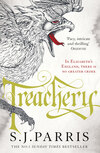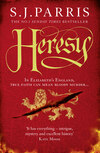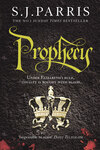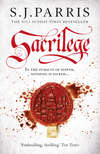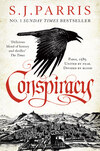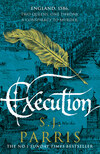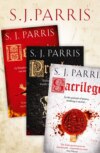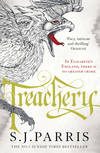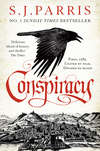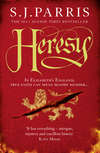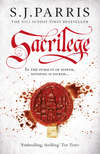Kitabı oku: «Treachery», sayfa 6
‘I was not aware that my renown, such as it is, had reached as far as Plymouth,’ I say, offering a polite smile.
‘We had heard whispers that Sir Philip Sidney was bringing with him a famed Italian philosopher,’ he says, returning the smile, though it does not touch his eyes. ‘Ambrose Pettifer, chaplain on the Elizabeth Bonaventure.’ He extends a hand, as if he has just remembered the correct etiquette. I grasp it; his handshake feels unpleasantly moist.
‘Giordano Bruno of Nola. Though you know that.’
‘I understand you are a fellow priest. A Dominican, if I am not mistaken?’
‘I’m afraid you are,’ I say. ‘I left my order almost a decade ago. I no longer consider myself in holy orders.’
He raises a pale eyebrow. ‘I did not think that was permitted?’
‘It’s not. That’s why I was excommunicated.’
‘Ah.’ His eyes widen briefly. He takes a sip of wine. ‘I hear you are condemned as a heretic by the Church of Rome for the ideas in your books.’
My smile is growing strained. ‘Generally by those who have not read them. In any case, I am in good company – the Pope also regards your queen as a heretic. And everyone who shares her religion.’
‘Yes,’ he persists, ‘but is it true that in your books you draw on ancient magic, and you write that man can ascend to become like God?’
I glance around in case anyone should overhear this. ‘I write about cosmology and philosophy, and the ancient art of memory. I have never argued that man can become like God.’ Not in so many words, anyway.
‘Good,’ he says primly. ‘Because that sounds like a Gnostic heresy to me. Even so,’ he continues, toying with his empty cup, ‘I would rather the crew did not learn that you were a Catholic priest. Englishmen are superstitious, you know, and sailors more than any. Under duress, it is the old faith they turn to. Many of them carry relics and holy medals, though they know these are forbidden, and I often hear them crying out to the Holy Virgin along with every saint in heaven.’ He folds his hands together. ‘I close my eyes and ears to it, of course, but it would not help if they knew there was a priest of the old religion aboard. You understand?’
‘Don’t worry, Padre,’ Sidney says, leaning in to catch the end of this, ‘Bruno is a long way from the priesthood now. He will not try and sneak the sacraments to them when your back is turned, I give you my word.’
I laugh, grateful to Sidney for trying to lighten the conversation, but Pettifer is not to be deterred.
‘You may joke, Sir Philip,’ he says, raising a finger, ‘but a man died by his own hand aboard the Elizabeth only two days ago. Imagine how this has affected the men. They talk of curses and omens and God’s punishment, and it makes it all the harder to keep them to the true path of faith. I have their souls in my care, you see.’
‘Well, I will do my best not to add to your burden,’ I say, reaching for the jug of wine. God, the man is insufferably pompous.
He gives me a tight little smile in response. ‘In any case,’ he says, ‘I presume you will be back on the road to London as soon as Dom Antonio arrives? Sir Francis will hardly be in a position to offer him much hospitality, in the circumstances. I dare say you would all be better off back at court.’
‘I dare say,’ Sidney agrees breezily. Fortunately, we are spared any further exchanges on this subject by the arrival of a trio of servants carrying dishes of salad leaves and manchet bread, followed by platters of fish poached in wine.
‘Caught off these shores, brought in this very morning,’ Drake says, indicating the fish, as proudly as if he had caught it himself. I see Sidney and the other well-dressed gentleman looking at it with suspicion; they regard fish as a penance, to be eaten on Fridays and in Lent when good Christians forego their meat, but Drake tucks in as if it were the best venison. After a year at sea, Sidney will have gained a new appreciation for fresh fish, I think, smiling to myself as I am served.
‘Do you mean to stay long in Plymouth, Lady Drake?’ Sidney asks, leaning across the table.
‘My cousin and I grow tired of our own company at Buckland Abbey when my husband is away,’ she says. ‘When we received word that the fleet was to be delayed in Plymouth, we thought we would pay a visit. Not that Plymouth has a great deal to recommend it, saving your gracious company, masters. But we are grateful for a change of scene. We may even take the opportunity to call by the drapers’ and buy some cloth.’
‘We ladies have to take our entertainments where we can find them,’ Lady Arden adds, with a dry smile.
Drake looks at his wife and beams approval. I watch her, curious.
‘And you, Sir Philip? How long will you stay?’ calls my neighbour, the newcomer. He has the imperious voice of a man accustomed to talking over others. His beard is carefully trimmed to a point and flecked with grey and he wears his hair cut very short in an effort to mask his encroaching baldness, but he is still handsome, in a weathered sort of way. I notice his upper lip is swollen, with a fresh cut.
‘At least until Dom Antonio arrives, Sir William,’ Sidney says, leaning down the table to offer a courtly smile.
‘Oh good God, is that Portuguese bastard still hanging about?’ Sir William says, rolling his eyes and holding out his glass for more wine. ‘You’d think he’d have given up by now. I can’t understand why Her Majesty goes on tolerating him, still less giving him money.’
‘Because he has a better claim to the throne of Portugal than Philip of Spain does.’ Sidney’s face grows serious and he sets down his knife. ‘If Dom Antonio became king, he would be our much-needed ally. You must know that since Spain annexed Portugal on the death of the old king, it now commands the biggest navy in Europe. It is clearly in England’s interest to oppose that.’
Sir William grunts. ‘It was a rhetorical question, Sir Philip. Besides, not even Dom Antonio believes he has a hope of regaining the Portuguese throne. Spain has bought off the whole of the nobility in return for their support. Pass the wine.’
‘Do you stay long yourself, Sir William?’ Sidney asks.
‘Me? I stay until the fleet sails.’
‘And then back to court?’
Sir William barks out a sharp laugh. ‘And then I sail with them, Philip. I have a berth aboard the Elizabeth.’
‘What?’ Sidney’s manners can’t quite keep pace with his emotions; his gaze swivels from Drake to Sir William, mouth open, until he composes himself and fixes Drake with a simmering glare.
‘Sir William Savile has invested very generously in this voyage,’ Drake says, although he has the grace to look a little sheepish. ‘And he has valuable military experience.’
‘Thought it was time for a bit of adventure,’ says Sir William, with a broad grin that makes him wince, as his split lip stretches. He dabs at it with a forefinger. ‘A chap can grow soft and idle, hanging about at court all summer with only women for conversation. Saving your presence, my ladies.’ He nods to Lady Arden, who says nothing, though her eyes dance with indignation. ‘At least, that was my intention, until this unfortunate business with poor Dunne—’ He looks over at Drake and breaks off; Drake is shaking his head, as if to warn him off the subject, presumably for the sake of the women.
‘How horrible,’ Lady Arden says, with a dramatic shudder. ‘What would make a man do that? Take his own life, I mean.’ She looks up at me, green eyes wide.
‘Despair,’ I say, since no one else seems inclined to answer.
‘Or fear,’ remarks Sir William Savile, tearing at a piece of bread.
‘Why do you say that?’ I ask, turning to him. He regards me, apparently surprised to be addressed so directly. He appears to weigh up my status before he condescends to answer.
‘Well,’ he says, eventually, ‘I suppose a man may be driven to a point where he considers death an escape from something worse.’ He looks into his glass as he speaks.
‘Worse than death?’ says Lady Arden, scorn in her voice.
‘There are many kinds of death, my lady,’ he replies. ‘Who knows what demons Robert Dunne was fleeing from.’
‘Did you know him well?’ I ask.
He shoots me a sharp glance. ‘Not well, no. He had lands in Devon, as do I. We had conversed on nautical matters a number of times, so I was pleased to discover I had been given the cabin next to his aboard the Elizabeth. I had thought we would have more time to talk during the long months at sea, but alas …’ He spreads his hands in a gesture of helplessness.
‘Did you speak to him the night he died?’ I lean forward, perhaps too eagerly. Savile frowns.
‘I think, gentlemen,’ Drake cuts in, ‘that the memory of our late comrade is not honoured by discussion of his death in this way. Especially over dinner.’ He smiles pleasantly but I catch the same warning tone in his voice that I noticed the day before. Savile meets his eye briefly and gives a curt nod of agreement.
The rest of the meal passes in ship talk, but the shadow of Dunne’s mysterious death hovers at the edges of the conversation, the subject we are all consciously avoiding. Whenever Drake talks about being able to set sail, I am conscious that he means when he has identified Dunne’s killer. It would seem that Savile and the women are still under the impression that Dunne hanged himself. If Savile had the cabin next door, Drake must have asked him about any unusual disturbance the night of Dunne’s death – and if he has not, perhaps it is because he has doubts about confiding in Savile. I could not blame him; there is something unconvincing about the man’s bluff bonhomie. I tell myself I should discuss this with Drake before I blunder in asking questions; then remember that I have sworn not to get involved in this business.
Further down the table, Sidney is regaling Drake and his wife with anecdotes of court life. Drake looks politely bored; his wife, by contrast, is hanging on Sidney’s every word, laughing with delight as if on cue, her eyes fixed on his. If that were my wife, I think, I would keep her well away from Sidney; at this rate, he will be writing her sonnets by supper. I watch Drake: his broad, tanned face, his big red hands that dwarf the wine glass he clasps between them. I don’t suppose she has a lot of sonnets from that quarter. When I look up, Lady Arden flashes me a knowing smile, as if she is following my thoughts.
As the servants are clearing the board, Drake leans in to whisper something to his wife and together they stand, excusing themselves as Drake announces he must now attend to his wife’s comfort and will see us later back on board. Savile’s moustache twitches with a smirk at Drake’s choice of words.
‘And who will attend to your comfort, Lady Arden?’ Savile says, from the side of his mouth, with a slight leer. ‘I am sure I could oblige.’
‘How gallant, Sir William,’ she says, with icy courtesy. ‘I’m afraid as a widow I must fend for myself. Now, if you will forgive me, gentlemen, I think I will retire to my room for a while. The emotion of discussing nautical charts at such length has quite worn me out.’ She smiles sweetly around the table and pushes her chair back.
The rest of us rise to our feet as the ladies and Drake take their leave and I turn to find Thomas Drake at my shoulder.
‘Sir Francis attends you and Sir Philip upstairs, in his wife’s chamber,’ he murmurs. ‘He wishes to speak with you in private.’
Padre Pettifer is just leaving, but he turns and catches my eye as Thomas is speaking. I am certain he has overheard. Again, I sense a hostility in the way he looks at me.
‘Rich as Croesus, that one, since the old man died,’ Savile mutters to me, jerking a thumb in the direction of the door.
‘I beg your pardon?’
He leans in with a wolfish grin. ‘Ah, no need to pretend. I saw how you looked at her. We’re all trying, believe me. Who wouldn’t want a ripe young widow with money in her coffers? But I tell you – Bruno, was it? – once a widow, there’s little incentive to become a wife again. They get a taste for independence, y’see.’ He nods a full stop, as if to confirm his disapproval. ‘She’ll make you work for it. They enjoy wielding their power. Still, may the best man win, eh?’
I smile. ‘The field is all yours, Sir William. I am in holy orders.’
‘Good God. Are you really?’ He draws back and squints at me as if I have just told him I have a tail. ‘Man of the cloth, eh? Whatever prompted you to do that? Still, don’t worry’ – he slaps me on the shoulder in that hearty way Sidney has – ‘Her Majesty positively encourages priests to marry these days. You stay in England, you might yet find yourself a nice little wife. Not a woman of rank, mind, but someone. I’ll keep my eye out for you.’
‘That’s very good of you, Sir William. Although you will be at sea for the next twelve months, at least. I fear the options will be limited.’
‘True, true,’ he says, rolling the tip of his moustache between his fingers. ‘Well – when I come back. A governess or some such might do you nicely.’
‘I humbly thank you.’
At the door, Sidney catches my eye and nods towards the stairs.
‘Where are you two going with such eager expressions, eh?’ Savile asks. ‘Don’t fancy some cards, I suppose? I’m bored witless on that ship.’
‘Have you been starting brawls for entertainment?’ Sidney asks, indicating his lip.
‘What, this?’ Savile reaches up and gingerly touches the cut. ‘It was nothing. A misunderstanding. Idleness frays tempers.’ He lowers his voice. ‘The men just want to set sail, you know. I understand Sir Francis wants to pay his respects to Dunne’s family, but really, there’s the rest of the fleet to think of, not to mention the investors. The longer we delay, the greater the chance one of Philip of Spain’s spies will catch wind of what we’re up to and slip him a warning. We won’t get as far as the Azores before some Spanish fleet jumps out on us.’
‘What spies?’ I ask.
‘They’re everywhere,’ he says, with a theatrical gesture that takes in the inn’s wide entrance hall. I look around. The place is empty, save for us. ‘Well, they’re bound to be – port full of foreigners, easy for them to slip into the crowd. Drake even keeps a damned Spaniard on his own ship – have you ever heard anything so absurd? I’ll wager he’s tipping off his countrymen somehow – terrible shifty look about him, y’know? Well, they all do, the Catholics – it’s those black eyes they have. Can’t tell if they’re looking at you straight.’
I regard him impassively with my black eyes until he gives a little cough. ‘Saving your presence.’
‘I’m afraid we must pass up the card table for now, Sir William,’ Sidney says, to cover the awkward pause. ‘We are going up to read some poetry.’
‘Oh, good Lord,’ Savile says. ‘Poetry. I’d rather put my balls in a wine press. God save you, gentlemen.’ With a brisk bow, he strides away to the tap-room.
‘Perhaps your man in black is one of these Spanish spies that have infested the place,’ Sidney muses, as we climb the stairs. I send him a withering glance. ‘Stop looking at me with your shifty Catholic eyes,’ he says, and skips out of the way before I can land a punch in his ribs.
FIVE
The room is larger and better furnished than the one I am sharing with Sidney; I see his gaze wandering around it with a touch of envy. There is no sign of the women. Drake sits on the end of an ornately carved bed. On his lap he holds a leather bag, his hands spread protectively over it, as if someone might try to snatch it from him. He looks up with a distracted smile and waves us to a chair with tapestried cushions by the fireplace. There is only one; Sidney sits, I lean against the mantelpiece. Thomas Drake stands with his back to the door and nods to his brother.
‘Gentlemen,’ Drake says. ‘There is something I wish to show you, but it must be done in confidence.’
‘Does it touch on the death of Robert Dunne?’ Sidney asks, sitting forward to the edge of his chair. Drake hesitates.
‘I believe so. I am hoping you might clarify that.’
From his place by the door, Thomas Drake makes a barely audible sound of disapproval. Drake looks up. ‘My brother feels strongly that what I am about to share with you should remain a secret. But I have explained to him that you gentlemen are scholars, as we are not. And I believe we may trust you. After all, you want something from me, do you not?’ He fixes Sidney with a knowing eye. ‘A passage to the New World?’
Sidney nods, silent.
‘Well, then.’ Drake smiles. He pulls at his beard, considering. ‘The question is where to begin.’
‘The letter,’ Thomas prompts. He does not sound enthusiastic.
‘Yes.’ Drake purses his lips, then takes a deep breath, as if he is about to embark on a difficult venture. ‘The same day we discovered poor Dunne’s body – that very evening, in fact – I received a message. It was brought to me on board the Elizabeth by my clerk, Gilbert, who collects letters that arrive for me every day from this inn. Here.’ He reaches inside his doublet and draws out a sheet of paper, which he holds out. I step forward and take it from his hand, as I am nearer. The paper is rough along one edge as if it has been torn from a notebook, folded in three and had been sealed with crimson wax, though there is no mark impressed in the seal. I unfold the paper and lower it so that Sidney can see it too. The message says simply,
Matthew 27 v 5
‘Cryptic,’ Sidney mutters, taking the paper from my hand and turning it over. ‘What is the verse? Bruno?’
‘I’ll wager he knows,’ Drake says, catching my expression and pointing at me.
‘“And he cast down the pieces of silver in the temple, and departed, and went and hanged himself,”’ I murmur. ‘The death of Judas Iscariot.’
Drake looks impressed. ‘Do you carry the whole of the scriptures in your head?’
‘Oh, Bruno is a master of the art of memory,’ Sidney says, with what might be a hint of pride. ‘He has devised his own system. It is what passes for entertainment where he is from. He can do you the whole of Homer if you find yourself bored one evening.’
‘That will make the voyage fly,’ Thomas Drake says, arching an eyebrow.
I return his sarcastic smile, and tap the paper in Sidney’s hand. ‘This verse. You think it is some reference to Dunne, I suppose?’
‘The day he dies, apparently by hanging himself? I see no other way to read it,’ Drake says.
‘According to the Gospel of Matthew, Judas Iscariot hanged himself from remorse after he betrayed his master,’ I say, running through the text in my mind. ‘Is this mystery correspondent trying to imply that Dunne did the same? That he hanged himself out of guilt? Had Dunne betrayed anyone, that you know of?’
‘But we don’t believe Dunne did hang himself,’ Sidney points out.
We look at Drake. He sighs heavily and opens the bag on his lap.
‘Betrayal. Perhaps. Or it may refer to something else.’ He reaches in and withdraws a bound manuscript. I straighten immediately, feeling goosebumps rise on my skin. In my thirteen years at the monastery of San Domenico Maggiore I spent much of my time in the scriptorium and among the archives of their library, and later among the booksellers of Venice; I can recognise manuscripts almost by touch and smell, and tell you their provenance by the feel of their bindings, their vellum, their ornamentation. I do not need to touch the one Drake now holds carefully between his fingertips to know that it is both old and unusual. Instinctively, I step forward and reach out for it.
He raises a hand. ‘Bear with me, gentlemen, while I tell you a story that will help to explain what I am about to show you.’
Sidney clasps his hands around his knees like an eager child at his grandfather’s chair. I shift my position against the mantel and give Drake my full attention.
‘It begins eight years ago, at the beginning of my voyage to circumnavigate the globe,’ Drake says. ‘Does the name Thomas Doughty mean anything to you?’
He directs this question to Sidney, who sits up, surprised.
‘Doughty? But of course – he used to work for my uncle Leicester. Before he was—’ he checks himself, looking at Drake, uncertain. ‘Before he died.’
‘He was executed,’ Drake says, brusquely. ‘In a godforsaken place called Port San Julian, in Patagonia, at the end of the world. He was beheaded on my order in plain sight of all my crew, and with good justification, whatever gossip you may have heard at court.’ He juts his chin out, as if challenging us to argue. Sidney shrinks back slightly into his chair.
‘But that is not the beginning of the story,’ Drake continues, his voice softer. ‘Early in our voyage, not far from the Cape Verde islands, we captured a small ship, the Santa Maria. She was on her way to the Americas, so there was nothing of great value in the hold, but she was worth the trouble for the provisions she carried and for the use of an extra vessel. I packed her crew into the longboats and set them adrift to shore – despite the reputation Spain wants to give me, I prefer to get where I’m going without bloodshed, if I can. But there was an unfortunate incident during the capture.’ He pauses and rubs the back of his neck, as if it discomforts him to recall. ‘On board the Santa Maria was a young priest travelling out to the colonies, a Jesuit. He barricaded himself into one of the private cabins when we boarded, even though the captain had surrendered almost immediately. Thomas Doughty and his brother John broke the door down. The young priest was backed into a corner, they said, holding a dagger in one hand, and with the other clasping to his chest a wooden casket. Naturally they assumed its contents must be of value – they asked him repeatedly to give it up to them, but the priest refused. When Doughty took a step towards him, the priest ran at the brothers with his weapon, calling down all manner of curses upon them. It was an act of reckless desperation – both the Doughtys were armed with swords and when the priest lunged with his little dagger, Thomas Doughty ran him through. When the Jesuit realised he was fatally wounded, he tried to throw the casket out of the window, but John Doughty managed to stop him. You may imagine their disappointment when they discovered that the casket contained only this old manuscript, in a language neither of them could read.’
He pauses, and motions to his brother to bring him a glass of wine. Thomas Drake pours from a jug on a small table by the door and offers it to us; Sidney accepts, though I shake my head, wanting Drake to continue his story. Already my mind is racing ahead, my eyes still fixed on the manuscript under Drake’s hands; if a priest was willing to sacrifice himself to save those pages, or even throw them into the sea to keep them from being found, they must possess their own kind of value. One perhaps only another scholar can assess.
‘Since none of us could read it, the manuscript was consigned to the hold of the Santa Maria,’ Drake says, after a long drink, ‘and placed in a locked chest to be inventoried with the rest of the spoils. The incident with the priest was regrettable, and did not sit well with the crew, for all their dislike of the Spanish. Thomas Doughty was not popular among the men – he was high-handed and did not believe a gentleman should shoulder his share of the manual work. We had barely left Plymouth before word had reached me that Doughty was criticising my command in front of the men, and I was obliged to reprimand him, which created open resentment between us. The crew began to mutter that the murder of a priest would bring curses on our voyage – some said the priest had invoked the Devil with his dying breath.
‘The Santa Maria was rechristened the Mary, in honour of my first wife, and I gave Thomas Doughty command of her, thinking this responsibility might persuade the men of my confidence in him, and quiet his rebellious mutterings against me. This was a grave error on my part, as I soon came to realise. I had instructed my brother to bring me the manuscript, together with some other items of value from the hold, for I did not altogether trust Doughty.’
‘He caught me taking them and accused me of stealing,’ Thomas Drake cuts in. ‘He and Sir Francis had a great row about it, with Doughty accusing me and my brother of helping ourselves to plunder which rightly belonged to all the men who had helped take the Santa Maria. While they were shouting, one of the crew whispered to me that they had seen Doughty coming up from the hold more than once, but no one had dared challenge him. Sure enough, we found a few rings and coins from the Santa Maria in his cabin. He claimed the prisoners had given them to him as gifts, but no one believed him, save his brother and a few malcontents they had won over to their side.’ He clenches his teeth; clearly the memory of the Doughty brothers still stirs his blood.
‘I deprived Doughty of the Mary’s command and moved him to another ship,’ Drake says, taking up the story again. ‘There he and his brother began to stir up a mutiny against me in earnest. Thomas Doughty spread the story that I had commanded him to kill the priest so that I could steal the Devil’s book. John Doughty told the men that he and his brother were versed in witchcraft, and when it pleased them, could conjure up the Devil to make a storm that would destroy my flagship and every man who defied them. According to others, Thomas Doughty promised them substantial rewards when we arrived back in England if they would side with him to mutiny and make him commander of the expedition. He boasted to some that before he was done he would make half the company cut one another’s throats.’ He folds his fingers together and presses them against his lips. ‘Tell me, was I supposed to tolerate such an open threat to my authority?’
He looks from Sidney to me with questioning brows; I suppose it is a rhetorical question, but we shake our heads vigorously nonetheless.
‘No indeed. I had him bound to the mainmast, to show him I was serious. When he was freed, I sent him to one of the store ships where I thought he could do no harm. We sailed sixty days south-west across the Atlantic without seeing land, and all the while I knew Doughty’s brother and his supporters were still murmuring against me for my treatment of him. The discipline of the voyage was in jeopardy. So when we reached Port San Julian, I empanelled a jury to try him for treason. You know the rest.’ He takes a sip of wine and looks away, as if he does not want to recount the end of the story.
Silence settles on the room, as Drake and his brother privately revisit their own memories of those events. I watch the Captain-General; he speaks as if he regrets the business with Thomas Doughty, but that unflinching ruthlessness is visible just below the surface. Drake is not a man you want to fall out with, I think, not for the first time.
‘And what of the manuscript?’ I prompt, nodding to it. Drake turns to me and blinks, as if working out where to pick up the thread of his story.
‘The manuscript,’ he says, considering. ‘Well. I kept with us the navigator from the Santa Maria, a Spaniard named Jonas. He had sailed to the coast of Brazil before and I thought his knowledge might be useful. He spoke English well and he agreed to act as translator. It was from him that I learned a little about the young priest Doughty had killed. His name was Father Bartolomeo and he was a Spaniard, but had joined the Jesuit College in Rome and from there found a position in the Vatican library. He had boarded the Santa Maria at the very last minute, arriving the day before they set sail and begging passage to the Indies, claiming he needed urgent conduit to the head of the Jesuits in Brazil. The only baggage he carried was that wooden chest that he never let out of his sight. Father Bartolomeo was some distant relative of the captain, so he was found a berth as a favour. Jonas said he had kept to himself, refusing to leave his cabin, but that from the little he saw of him, he thought the Jesuit acted like a man in fear for his life. He was edgy, always looking over his shoulder, even once they had cast off. The crew had started to wonder if he had stolen whatever was in that chest and was running away to escape justice. When the cry came that the Santa Maria was under attack from my ship, Jonas said the priest locked himself in his cabin, but everyone on board could hear him crying out to Jesus, Mary and all the saints to forgive him for bringing the wrath of God on the voyage.’
‘What did he mean by that?’ Sidney asks.
Drake shrugs. ‘If he’d lived, he might have been able to explain. Or at least tell us something about this book. But the Doughty brothers made sure he took his explanations with him to his Maker.’
‘May I see the book?’ I ask softly, unable to contain my curiosity any longer. Drake hesitates.
‘I am no scholar, gentlemen, as I have told you. But even I know that a man does not throw away his life lightly over a book. I kept it under lock and key in my cabin for the rest of the journey, but with Doughty’s trial and everything that came after, the book was almost forgotten.’
I am still holding my hand out for it, nodding encouragement, as you might coax a child to part with a favourite toy. Drake smiles.
‘You are keen, sir. And you are not alone in your eagerness to get hold of this book. But first, I want a promise of your complete secrecy. You too, Sir Philip. Whatever this book contains, two men have already died for it. The fewer people who know I have it here, the better.’
‘I give you my solemn oath,’ I say. ‘On everything I hold sacred.’
Sidney sends me an amused glance from the corner of his eye; I guess he is wondering what it is that a man like me could hold sacred. For all he likes to believe himself an adventurous thinker, Sidney is obediently orthodox in his Protestant faith.
